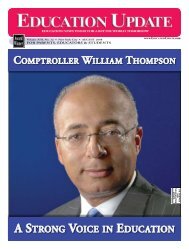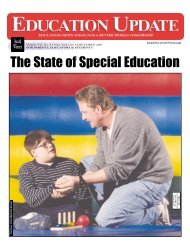Download PDF - Education Update
Download PDF - Education Update
Download PDF - Education Update
You also want an ePaper? Increase the reach of your titles
YUMPU automatically turns print PDFs into web optimized ePapers that Google loves.
New York City • NOV/DEC 2010 • 11Cancer Research FundHonors Dr. Charlotte FrankThe Israel CancerResearch Fund held anevening of breast cancerawareness at the homeof Acting Consul Generalof Israel in New York,Ido Aharoni. ICRF is thelargest single source ofprivate funds for cancerresearch in Israel . Theorganization has awardedmore than 1700 grantsto exceptional scientistsat all of Israel’s leadinginstitutions. These scientistsinclude the firstIsraelis ever to win theNobel Prize in chemistry.NYU COLLEGE OF NURSING“Feeling Good InYour Neighborhood”The NYU College of Nursing has beenawarded a $ 2.9 million, five (5) year, FederalHealth Resources and Administration (HRSA)grant to fund its Mobile Health Van Program(MHVP), “Feeling Good in Your Neighborhood”announced Dr. Terry Fulmer, Dean, NYUCollege of Nursing.“Feeling Good in Your Neighborhood” is acommunity outreach program offering schoolbasedprimary health care services to underservedand recent immigrant adolescents at BrooklynInternational High School, Prospect HeightsInternational High School, Brooklyn School forMusic and Theatre, and Urban Assembly Schoolof Music and Art. The new, fully equippedMobile Health Van is staffed by highly qualifiednurse practitioners, registered nurses and otherprofessionals who provide health care servicesin a friendly, safe environment.“The goal of the Mobile Health Van Programis to promote positive health outcomes andself-efficacy for adolescents whose studentpopulation is underserved and who have noschool-based health services,” says Dr. JudithHaber, Principal Investigator, Associate Dean ofGraduate Programs, NYU College of Nursing.“The grant will enable the MHVP to continueto strengthen the overall health capacity of theseteens, their families and communities.”“With HRSA’s generous contribution, theMobile Health Van Program over time will haveestablished itself as a financially self-sufficient,replicable model of nurse managed communitybasedprimary care,” says Terry Fulmer, Dean,NYU College of Nursing. “The tenacity anddedication of our faculty has lead to the continuedsuccess of the Program.”The Mobile Health Van Program will implementthe “Set-Up, Catch-Up, Hook-Up” modelof nurse managed primary care coordinationwhich seeks to address primary care serviceswith a three-fold approach: “Set-up” involvesan assessment including completion of healthhistory, practices, and care needs; “Catch-up” isthe intervention phase when outstanding healthneeds and priorities are dealt with through primarycare clinical services and health literacyeducation; and finally, “Hook-up” refers to theprocess of linking the student with insurancecarrier/enroller, community based primary careprovider and primary care medical home specialistservice for follow up of specific healthconcerns and/or linkages/referrals to communityresources.#Acting Consul General of Israel in New York, Ido Aharoni,and Dr. Charlotte Frank, who was honored at the 2009ICRF Women of Action benefitDr. Bertrand Bell: Championof Graduate Medical <strong>Education</strong>Revisits The Bell Commissionby Jacob Appel, M.D., J.D.Most medical educators are interested in whattheir students know. Dr. Bertrand M. Bell, aleading professor at the Albert Einstein Collegeof Medicine, is just as interested in what theydon’t know. “What is the greatest challengefacing medical students and house officers?” heasks. “Knowing that you have to ask when youdon’t know the answer.” He adds that “medicalculture still says the opposite—and that’s dangerous.Arrogance [among physicians-in-training]is still a major problem. If you don’t admit whatyou don’t know, that’s how you get into trouble.”Dr. Bell knows a lot about what junior physiciansdo and do not know. Studying andimproving the training of medical interns andresidents—he calls them “graduate medical students”—hasbeen a central focus of a medicalcareer that has spanned more than half a century.He is most famous for giving his eponym to the1987 final report of New York State’s Ad HocAdvisory Committee on Emergency Services,which he chaired. “Using the formal name ofthe committee was too long so the press decidedto call it the Bell Commission. There weresome very prominent people on the committee,”reflects Bell. These included Thomas Morris, thePresident of Columbia-Presbyterian Hospital,and Robert Friedlander, the Dean of AlbanyMedical College. “But I was the chairman, soit’s named after me.” The committee was authorizedby Governor Mario Cuomo following thepublicity surrounding the controversial death ofeighteen-year-old Libby Zion at The New YorkHospital in 1984. Among its best-known recommendationswas an eighty-hour work week formedical residents.Bell is clearly pleased that, over time, theBell Commission’s hour recommendations havegained traction nationally. However, he remainsconcerned that many of the Commission’s recommendationsregarding supervision have goneunheeded. “Our findings…emphasized the issueof supervision,” he wrote in a follow-up article,“but it is the hour issue that has always been thefocus of the profession and the public.” Twentythreeyears after his initial report, he still viewsbetter supervision as crucial to improving medicalcare. “Graduate medical students need to bewalked through the process [of delivering care]step-by-step,” he notes. He derides the dictumof “see one, do one, teach one,” which hasDr. Eve Kurtin Honored in Los Angelesbeen a guiding philosophy in American medicaleducation for many decades. “I like to say ‘seeone, do one, teach one, kill one,’” he observes,emphasizing that doing a procedure one timeis clearly not enough experience to perform itunsupervised in the future.Needless to say, many in the medical professionresisted Bell’s efforts, particularly thoserelating to duty hours restrictions, on the groundsthat transferring patients between residents morefrequently would lead to increased medicalerrors. Dr. Bell has one word for those critics:“Palaver.” He adds that there is no empiricalevidence to support their claims, but much tosupport his own. “All they have is the Fiddleron the Roof argument. Do you know what thatis? Tradition! It dates all the way back to thefirst residency program at Johns Hopkins.” Bellnotes pointedly that the Fiddler on the Roofmodel kills patients.Even before his service on the Bell Commission,Dr. Bell was no stranger to controversy. “I wasalways doing controversial things,” recalls Bell.“I write letters to people. Lots of letters. Youknow those window guards in hospitals andhousing projects? That’s me. I got the ire ofEd Koch when I insisted they would save lives,but he agreed to make it happen—if I stoppedwriting him letters. I think we saved a lot oflives that way.” Bell is also regarded by manyas the father of emergency medicine, as he wasone of the first practitioners to approach emergencycare as a separate discipline from generalinternal medicine. Bell faced reprisals afterhis Commission’s recommendations and wasultimately replaced as Director of AmbulatoryCare Services as Einstein, likely as a result ofhis efforts. Yet he has no regrets. “I’ve neverbelieved in tenure,” he observes with relish, “butI have tenure….I still had a wonderful job thatnobody could take away from me. They pay meevery day to do a mitzvah.”At age eighty-one, Bell still enjoys his calling.“Many of my patients have died, but I still gointo work four days a week,” he says. “And Istill try to find out what I don’t know. I discuss‘the case of the week’ with my daughter [whopractices medicine in Minnesota]. I love going towork. I work with a wonderful bunch of peopleand everyone knows my name.” Indeed, it maybe the only medical eponym many physicians-intrainingever remember.#Eve Kurtin Steinberg was honored recentlyat Friends of Sheba Medical Center’s annualWomen of Achievement Luncheon at the BeverlyHills Hotel in California.Since 1987, the Women of AchievementAwards have recognized women who distinguishthemselves by their professional accomplishments,outstanding humanitarianism, or heartfeltcommitment to making a difference in the livesof others. Friends of Sheba presents the Womenof Achievement Awards to those who embodythe spirit of compassion, selflessness and givingon which Sheba Medical Center was founded.The recipients’ leadership and creativity, alongwith their boundless spirit and goodwill, inspirehope and peace for the future.Dr. Eve Kurtin Steinberg is passionate aboutinvesting in people, whether they are patients andhealth care providers, members of her community,or in Israel. Her life’s work is dedicated toinspiring innovation that will improve the qualityof lives around the world.For more than 30 years, Eve has been a leadinghealth care executive and investor. She currentlyserves on the boards of Vantage Point VenturePartners and associated companies: CenterreHealthcare, Asteres, SafeLife, Allocade, andPhreesia. She joined Vantage Point from PacificVenture Group, where she was managingdirector. Prior to that, she was thefounder and CEO of Physician VentureManagement and was a vice presidentwith American Medical International.She currently serves on the board ofthe American Physician Foundationand is a founding member of theRAND Health Board of Advisors.Eve received a Doctorate ofPharmacy from the Universityof the Pacific and an MBA fromthe University of California, LosAngeles.#
















